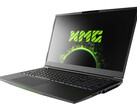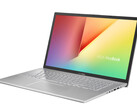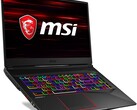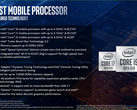Laptops powered by the new Intel 10th gen Comet Lake-H processors have now started to become available and we've been steadily receiving quite a few of them in our test labs. Previously, we have exclusively posted some first benchmarks of Comet Lake-H that we received from industry sources, which showed Intel continuing to have a small yet appreciable lead in single-core performance compared to AMD Ryzen 4000 H-series chips.
Now, we have managed to do some in-house testing of the Core i7-10875H powering the new Gigabyte Aero 17 HDR XB laptop. A full review of the new Aero 17 HDR XB will follow soon, but here are our first thoughts on how the Core i7-10875H stacks up when compared to 9th gen CPUs and the competition from AMD Renoir Ryzen 4000.
Core i7-10875H — Cinebench R15 and R20
Let's start off with the ever-popular Cinebench R15 and R20 tests. Compared to the average scores posted by the Core i9-9980HK and the Core i9-9880H, the Core i7-10875H in the Gigabyte Aero 17 HDR XB seems to have a 7% and 11% lead, respectively in the Cinebench R15 single-core benchmark. We see that the scores of the Aero 15 Studio XB and the Aero 17 HDR XB are nearly the same in the single-core bench and differ at best by 5% in multi-core indicating that the larger 17-inch chassis does not influence the performance much. We expect to do a Cinebench loop test in our full review of the laptop to see if the larger chassis can afford any benefits in sustained performance, so keep an eye out for that.
The AMD Ryzen 9 4900HS powering the Asus Zephyrus G14 trails by 9% in CB15 single when compared to the Core i7-10875H but is either on par or slightly faster than the Core i9-9880H. This is a strong comeback by AMD in single-core performance, and coupled with perceivable leads in multi-core, it is an indication that gaming laptop segment is no longer an Intel-only dominion.
The Ryzen 9 4900HS leads the CB15 multi-core test next only to the Core i9-9900K. Here, we see that both the Ryzen 9 4900HS and the Ryzen 7 4800H show 11% and 10% leads, respectively over the Core i7-10875H. This is a fairly significant number and unless you really need that small extra burst in framerates or responsiveness, the Ryzen 9 4900HS looks to be the overall better contender in this benchmark.
The differences further reduce in Cinebench R20 with almost no benefit seen in the Core i7-10875H's single-core scores compared to the Ryzen 9 4900HS. There is a significant delta when it comes to multi-core with both the Ryzen 9 4900HS and the Ryzen 7 4800H leading by 25% and 22%, respectively when compared to the Core i7-10875H.
Core i7-10875H vs the competition — Other CPU benchmarks
In tests such as Blender, we see that the Core i9-9880H in the Apple MacBook Pro 16 is still able to beat the newer Core i7-10875H by 7%, which in turn is as much faster compared to the Ryzen 9 4900HS. A healthy 17% gain is seen with the Core i7-10875H compared to the Ryzen 9 4900HS in 7-Zip single core, but the AMD offering regains lost ground in the multi-core benchmark. A similar pattern is seen in Geekbench 4 as well. WinRAR is Intel's show all the way while AMD manages to offer decent leads in all TrueCrypt tests. When it comes to 3DMark Fire Strike Physics, AMD seems to have the upper hand here though not by much.
* ... smaller is better
Going purely by the CPU benchmark results, we see that Intel and AMD are fairly balanced at this point and the choice of CPU for your next notebook depends solely on your workflow. Intel still seems to offer the best single-core performance there is and with sufficient cooling, the higher-end Comet Lake-H chips can boost very well, although the gen-to-gen uplift itself isn't that significant. How long will these processors be able to sustain that boost remains to be seen, however.
We would need to factor in power draws and energy efficiency as well. We will discuss more about these factors in our full review of the Gigabyte Aero 17 HDR XB laptop very soon. Intel's 14nm process is now becoming archaic and the fact that the company could still milk the last drops of performance from what is essentially a Skylake chip is commendable but not in line with market expectations.
AMD, on the other hand, has come a long way with the Renoir Ryzen 4000 series and has managed to successfully bridge the single-core performance gap by a long shot. The Ryzen 9 4900HS leads the multi-core tests and will likely be the preferred choice of creative pros who also like to game. The Ryzen 9 4900HS's TDP is capped at 35W and combined with the benefits of the 7nm process and the purported improvements to battery life, AMD may just have clinched this generation.
Considering the impressive scores on show for AMD chips here, let's hope OEMs offer enough Ryzen 4000-powered laptops throughout the year so that consumers can enjoy a greater choice.
Source(s)
Own



















